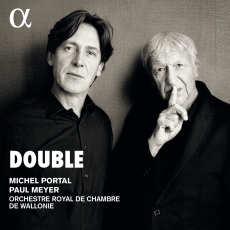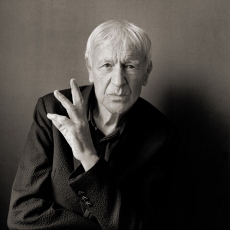Michel Portal & Paul Meyer - Double - Fanfare
This recital was recorded in January 2018, when Michel Portal was 82 years old. That’s extraordinary for a clarinetist; even the New York Philharmonic’s Stanley Drucker retired at 80. Portal still has remarkably good sound control and a nimble technique; I couldn’t really tell which clarinetist was which here, which is high praise for Portal, since Paul Meyer is one of the world’s top clarinetists.
The program opens with Carl Stamitz’s Concerto in B♭ for Two Clarinets, misidentified here as Clarinet Concerto No. 4. This turns out to be the same piece as the Concerto for Clarinet and Violin, recorded by Eduard Brunner and Ana Chumachenco on Tudor as part of Brunner’s complete recording of Stamitz’s clarinet concertos. It’s actually better on two clarinets; there are lots of parallel thirds and sixths, and the balance is superior with the two like instruments. Also notable in this reading is the use in the orchestra of horns in B♭ alto; the score notes that it is unclear from the first edition whether alto or basso horns are intended. The high horns give the orchestra a brilliant sound, not inappropriate for the nature of the music.
The chalumeau was a predecessor of the clarinet, so the performance of this concerto by Telemann on clarinets is suitable. The solo parts in this version utilize for the most part the middle register of the clarinet, but the work is skillfully scored so the clarinets sound well. The Sonata in E Minor “without a bass part,” i.e., unaccompanied, was originally written for two flutes. Tōru Takemitsu’s arrangement of Tchaikovsky’s “Autumn Song” for clarinet and string quartet is tasteful; Meyer plays it attractively with string orchestra.
Mendelssohn’s two Konzertstücke, originally written for clarinet and basset horn with piano, are played on two clarinets with orchestral accompaniment. (One of the orchestrations is by Mendelssohn; the other is presumed to be by Heinrich Baermann.) Portal’s and Meyer’s playing is above reproach here, but the pieces lose much without the registral and timbral contrast that the basset horn provides; try Dario Zingales and Marco Sala on Brilliant Classics (Fanfare 44:1) for the original versions. Finally, C. P. E. Bach’s Duet in C Major (played here in B♭) is a transcription of a work originally for musical clock; it is, as expected, of slight musical value.
Portal and Meyer play all this music with style and verve. I will be keeping this disc for the Stamitz and Telemann concertos, although the various arrangements are also enjoyable.


